The Bear fire nearly wiped this town off the map. Miraculously, one landmark survived
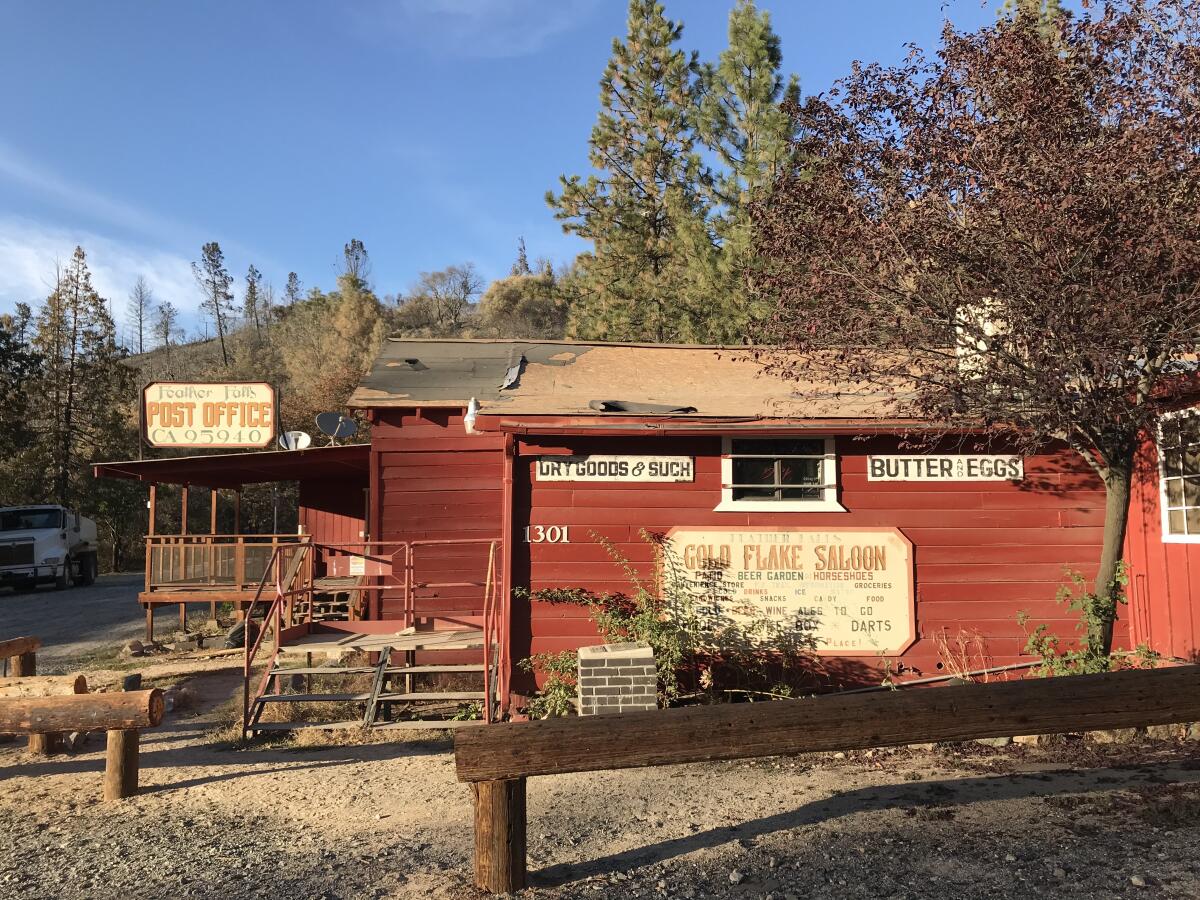
- Share via
FEATHER FALLS, Calif. — When the Bear fire barreled over the mountain ridge headed for the Butte County town of Feather Falls, Nancy Baker Preston and her daughter Kellie Swann made a pact: meet at the Gold Flake.
After packing their most important possessions, Preston and Swann converged at the historic saloon, which doubles as a post office with a small grocery. The sky burnt the air orange, transforming trees into a glowing green. Ash fell like snow.
Inside the saloon, the phone was “ringing off the wall,” said owner Sandy Bourasa, 53. In a mountain town with spotty cell signal, the old saloon’s currency is information. Even during normal times, the pulse of Feather Falls runs through the Gold Flake’s phone lines. As one of two volunteer firefighters in town — the other is her husband, Craig, 57 — Bourasa pleaded with her neighbors: “Get off the hill.”
Since lightning storms ignited Plumas National Forest on Aug. 17, smoldering for weeks and then exploding into the North Complex fire, much of the state’s attention has focused on the town of Berry Creek, which was obliterated in the flames, killing at least 13 people. But at roughly the same time, on Sept. 8, the fire roared into Feather Falls, taking with it the lives of two residents: Randy Harrell, 67, and Jacob “Jake” Albright, 74, a former Gold Flake owner.
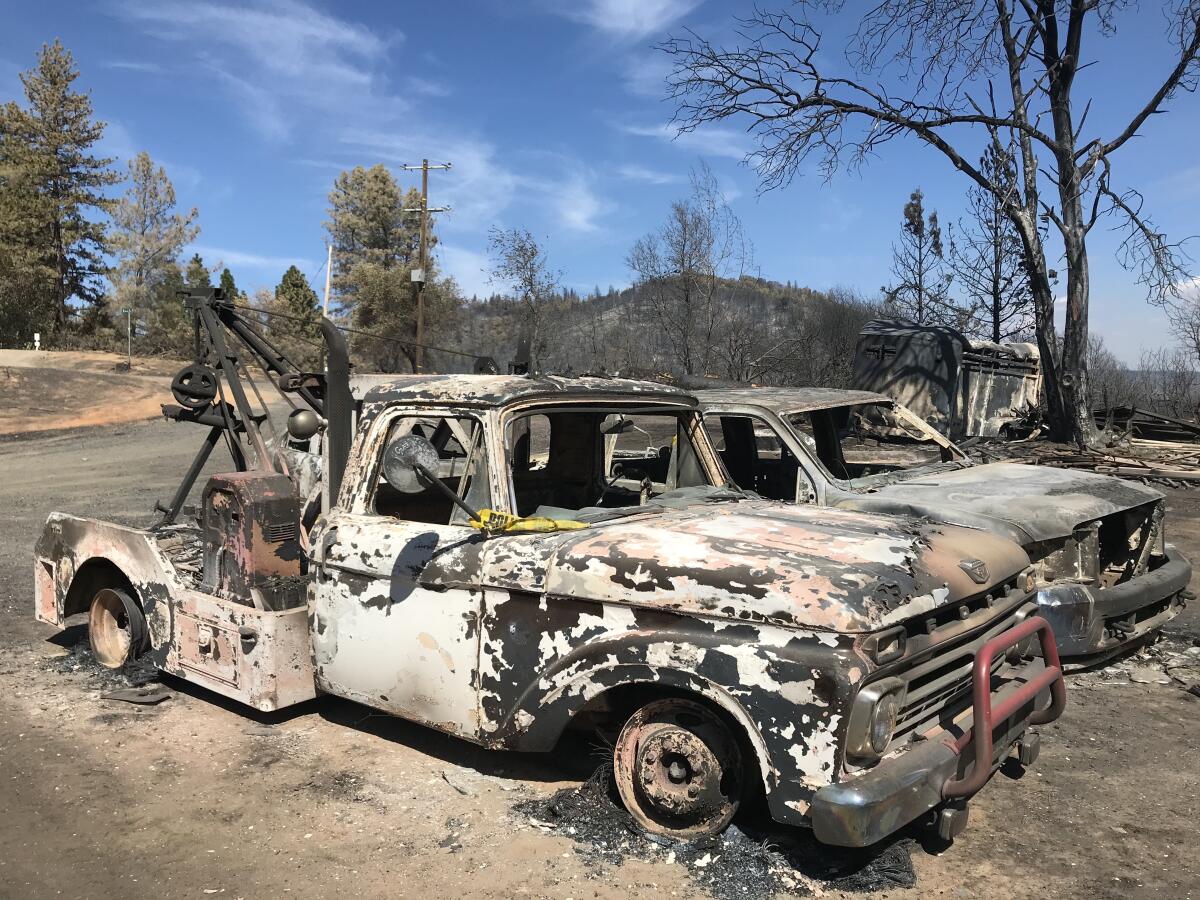
Dozens of homes, the meetinghouse, the schoolhouse and acres of beloved forest are gone. Preston, Swann and their families survived with their homes mostly intact (a shed on Swann’s property collapsed, breaking 12 solar panels and a freezer full of food).
As of Saturday morning, 78% of the fire was contained as fire crews fought to hold their lines of protection ahead of a weekend of windy weather. The Gold Flake, Feather Falls’ last remaining landmark of the tightknit mountain town, stands untouched.
“That’s the hub of the community,” Bourasa said Thursday. “And it’s the only thing we’ve got.”
Dating back to at least the 1950s, the Gold Flake Saloon is a nod to the region’s mining past, painted barn red with signs that advertise “dry goods and such” and other necessities, such as horse shoes and “ales to go.” Though it has moved around throughout the years, the town post office next door officially turned 100 years old in March, according to Bourasa.
The bar is open every day for residents to swing by and shoot a game of pool or gab with Swann, one of the saloon’s four employees. Every holiday is celebrated at the Gold Flake, with dress-up Halloween parties and full Thanksgiving spreads, complete with fried turkeys.
Craig Bourasa was stationed at the Gold Flake, distributing water to other fire crews from his truck. Someone at headquarters radioed him that the fire was headed his way. He drove around the corner and pulled out his phone, ready to film his business going up in flames. Then his radio patched again: “Structure protection for the Gold Flake.”
Within minutes, a fire crew had drenched the property, saving it from flames coursing down the mountain, and sparking hope for the small mountain community’s return.
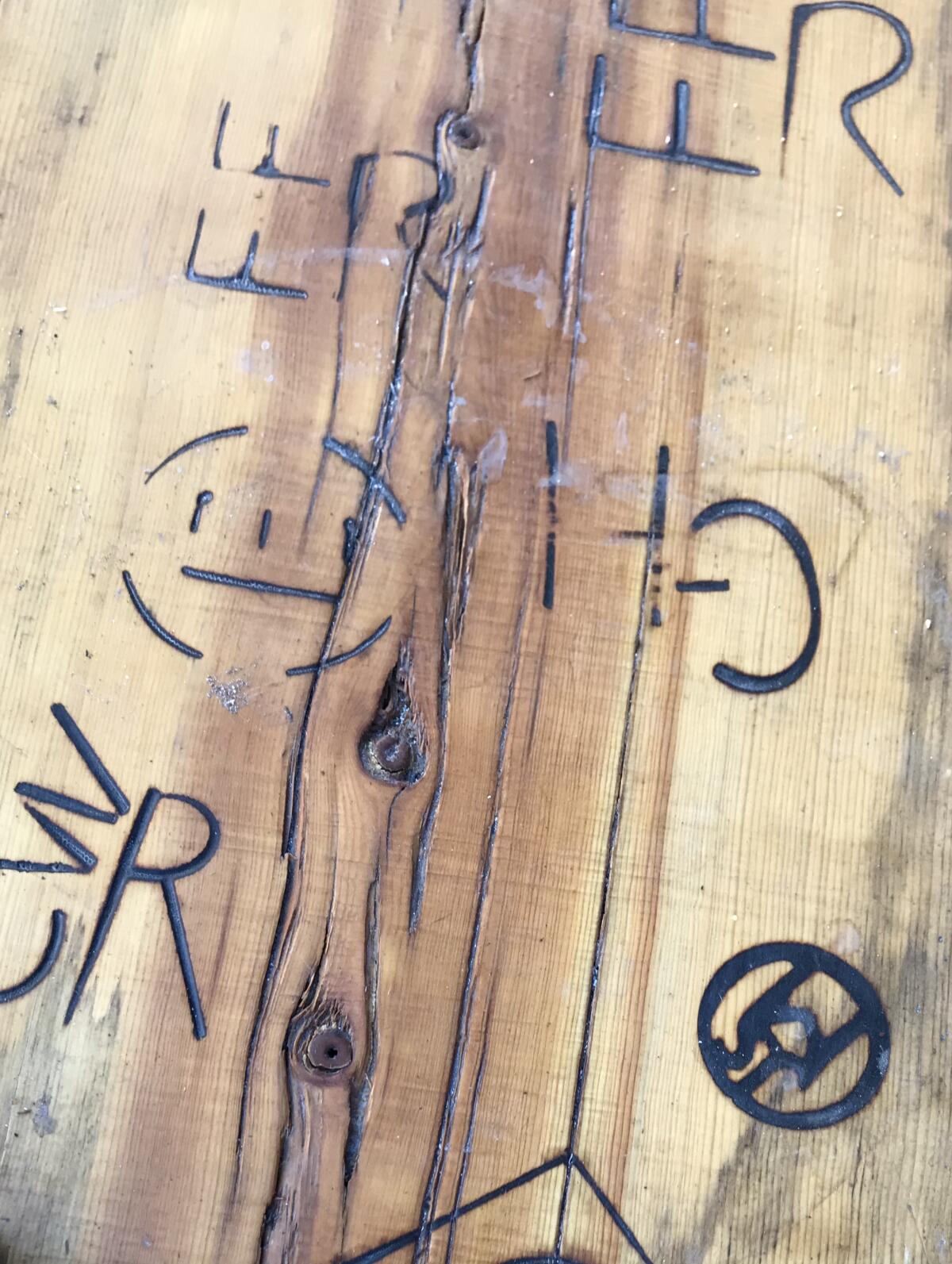
Feather Falls sits just over the charred ridge southeast from Berry Creek and about 50 miles from Paradise — site of the 2018 Camp fire, California’s deadliest. Residents cherish the quiet but fiercely tightknit mountain community. Maidu people nurtured their native land for hundreds of years before settlers came and built a prosperous logging industry. A cluster of red-and-white cabins, a general store, a doctor’s office and a post office became “the village,” centered on a wood mill.
In the late 20th century, Sierra Pacific Industries acquired much of the land, including the village, to expand its lumber production.
Now, Feather Falls is little more than a web of roads tucked into the mountains, a tiny sliver of unincorporated land in Butte County. It’s so small, the 2010 U.S. census clumped it with nearby Berry Creek, Forbestown and Clipper Mills to estimate a population of 2,565, according to the Butte County Sheriff’s Office. Locals say the real number in town is probably close to a couple hundred.
“It just is a feeling that’s in your heart and your whole being,” said Preston, 71, describing Feather Falls. “It’s like Lassie coming home or something. It’s home.”
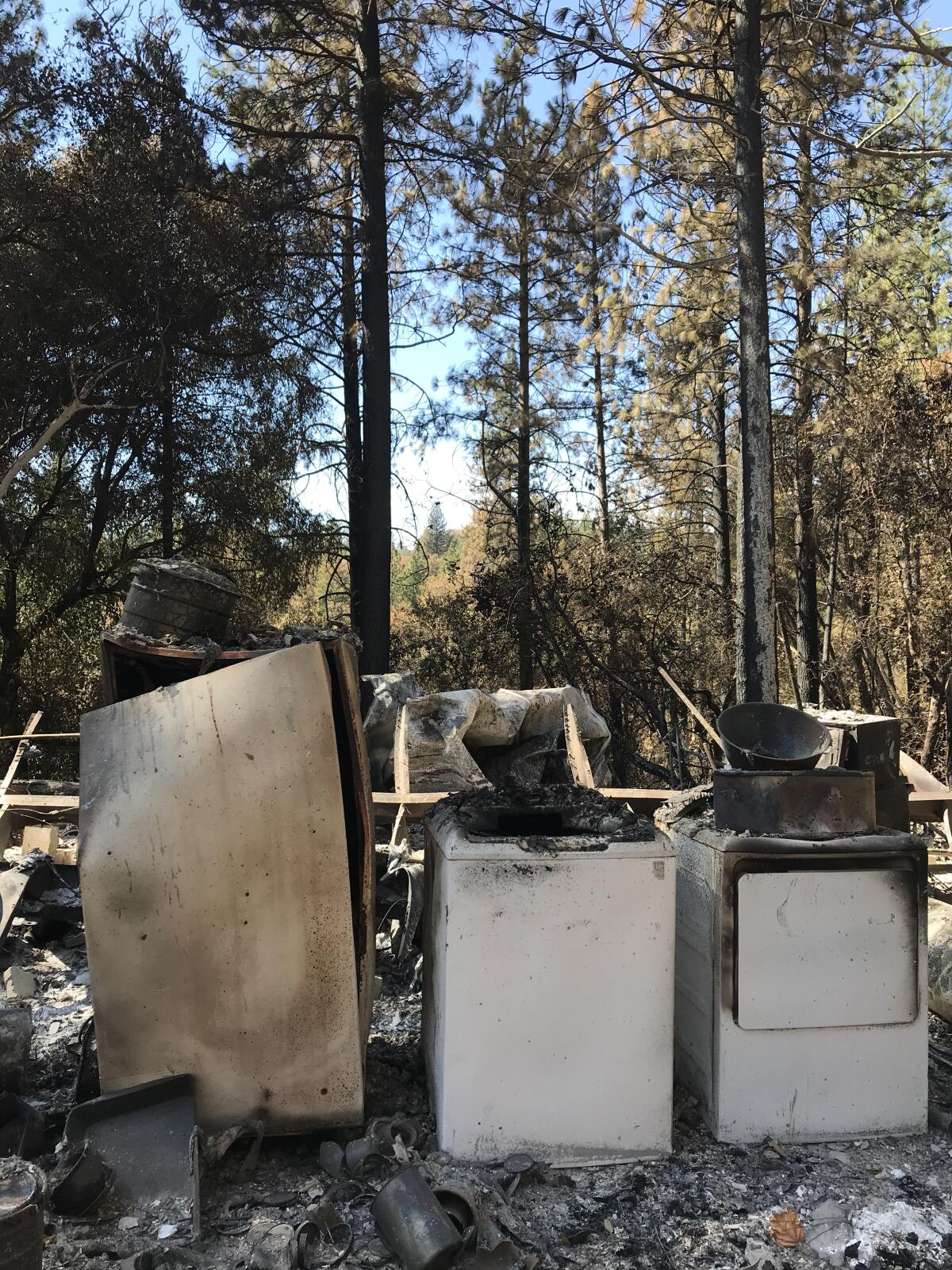
Strangers may pass through without even witnessing a town. But for Preston, who has lived in Feather Falls since 2000 and for a few years in the 1970s, the map is imprinted in her memory. She rattles off sites with a flick of her hand: That’s where her best friend lived. Here was the schoolhouse where her granddaughter graduated last year. There was the old village.
Now, only ghosts of those landmarks remain.
“I know where I am, but, I mean, all the stuff — the trees, the view, all the buildings,” her voice trailed off.
In total, the North Complex fire killed 15 people and burned 304,619 acres, destroying 2,248 structures and damaging 112 structures. It is the fifth-largest fire in the state and has destroyed the sixth-highest number of structures of any fire, according to the California Department of Forestry and Fire Protection.
The fire destroyed entire structures but left certain relics untouched: a white lamppost, a green storage container, an American flag, a pile of broken dishes where a cupboard burned.
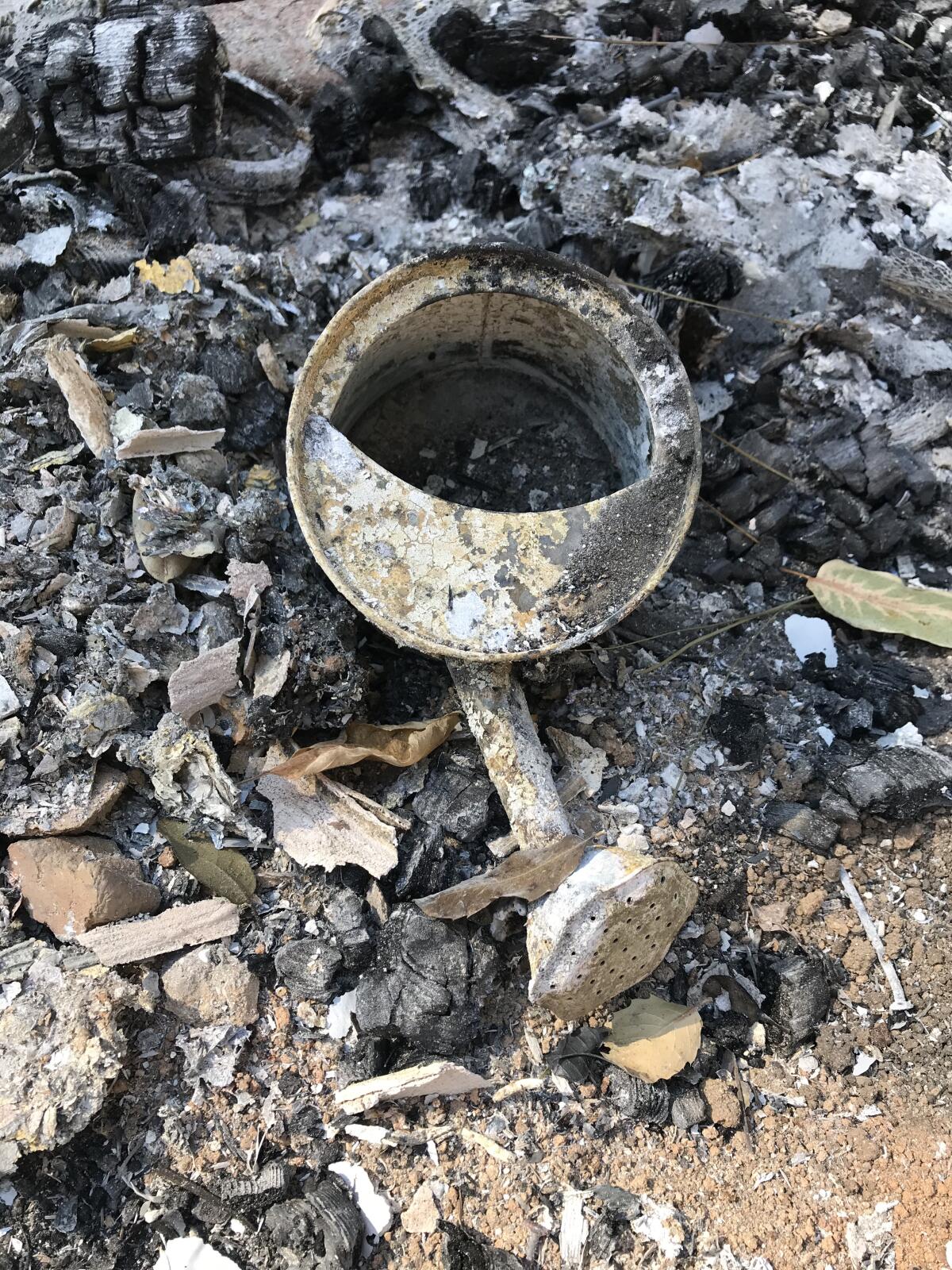
Preston is no stranger to destruction by wildfire. Her own property — with its swimming pool, deck and tennis court — burned in the 2017 Ponderosa fire. She and her partner lived briefly in a friend’s cabin before moving into her former garage on the burn scar.
“It’s like pioneer glamping. You’ve got to be tough,” she said.
But Preston brushes away talk of the Ponderosa fire with a dismissive wave.
“I prayed that the rest of my community, family and friends would never have to feel what I felt three years ago,” Preston said. “Now they all do, and I hate that. It hurts worse than losing my home, because we lost all of our historical buildings. All of our gathering spots, except the Gold Flake. All of our trees. And we’ll probably lose more. The worst thing is the two deaths.”
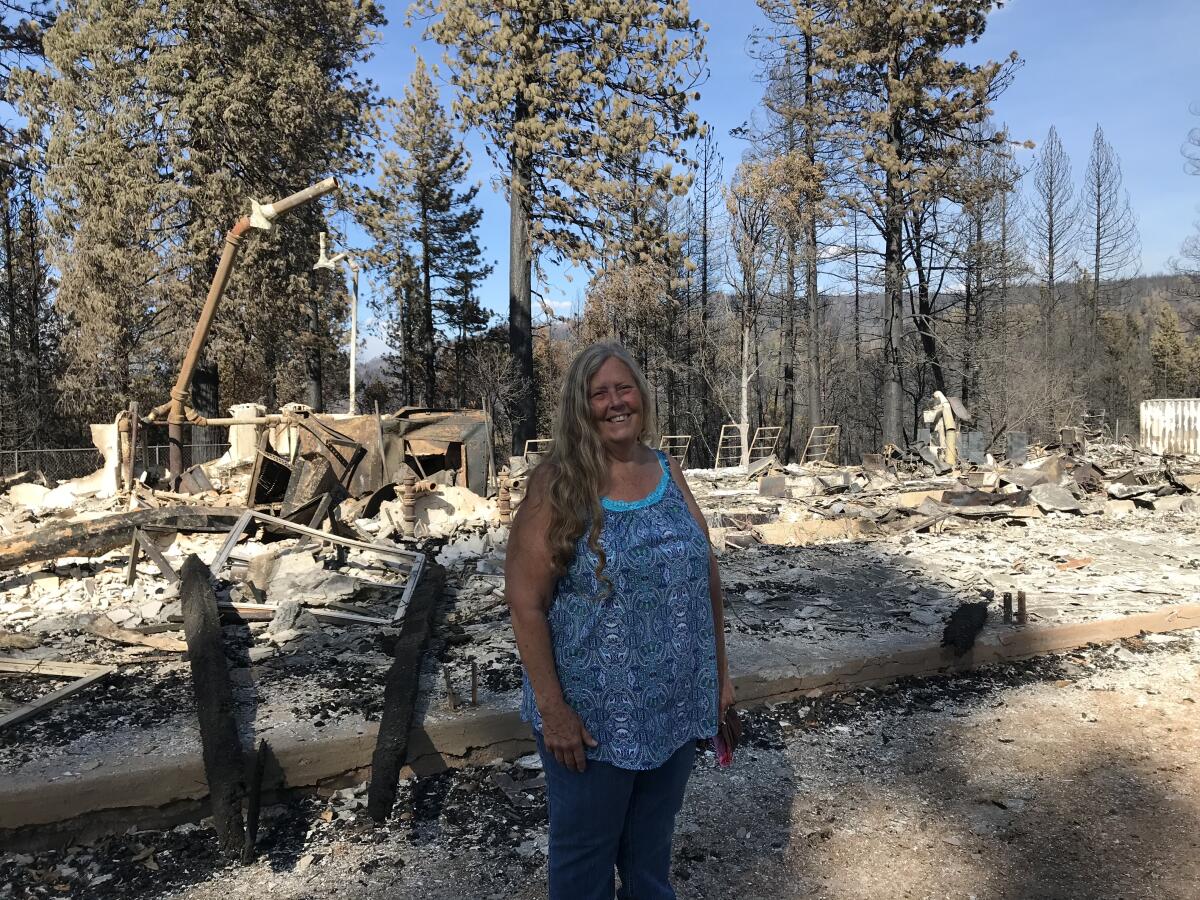
Among the landmarks lost was the schoolhouse, where Feather Falls Union School District held classes until it closed in 2019 because it was too small, with only about 10 children.
Also lost was the Grange, a meetinghouse for special events run by a local nonprofit.
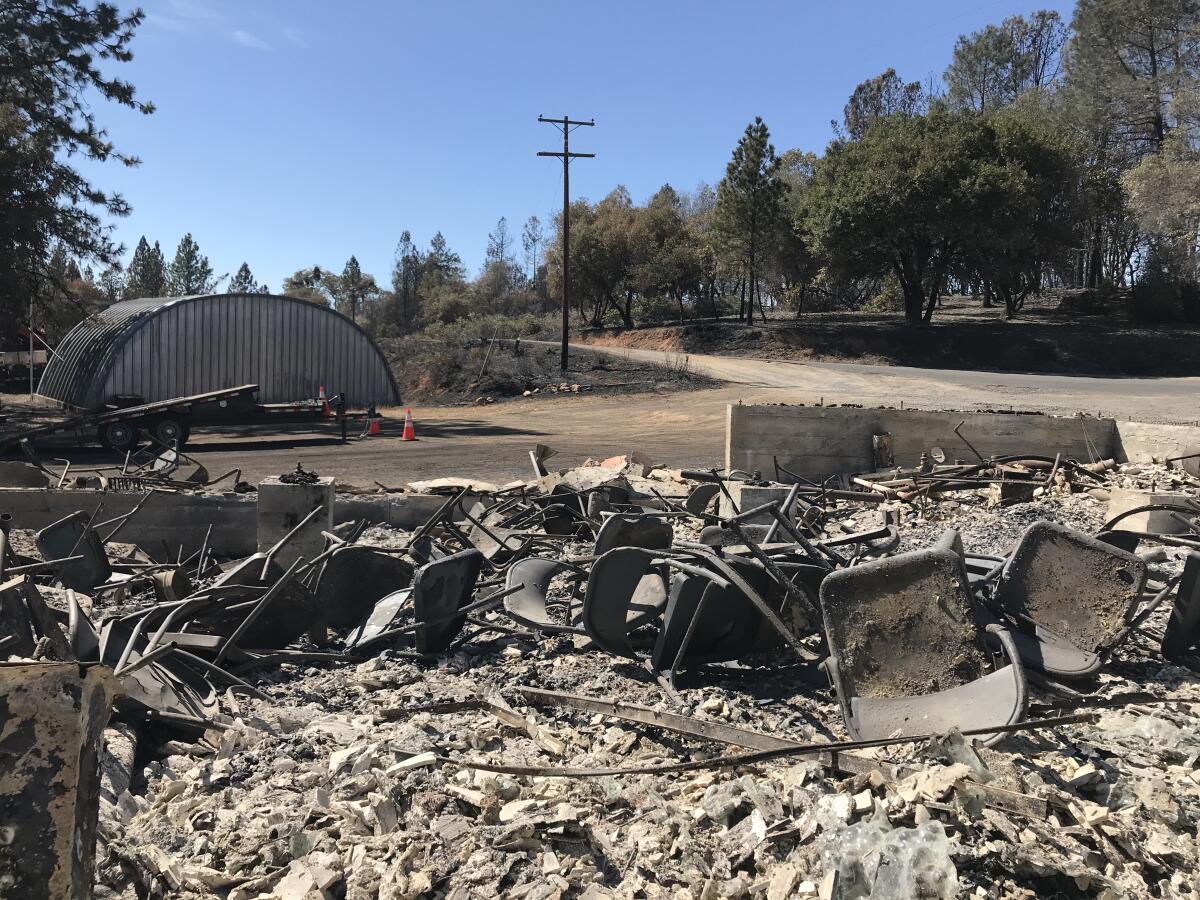
For many residents, the forest was among their most heart-wrenching losses. Just days before the fire, children romped through the woods. On weekends, residents went riding on four-wheelers, swimming in one of the ponds or fishing in the nearby lake. Oftentimes, they were satisfied to simply drive through the mountain and find a spot by the river to camp out for the day.
“All of these are gonna die, all these trees,” Preston said, sighing. “You move here for this beauty.”
A few people have already decided not to move back to Feather Falls. Swann, who has lived in Feather Falls much of her life, is reevaluating her future there, although she is glad that Bourasa, the Gold Flake owner, plans to reopen Wednesday.
“I’m ready to get back and do some work and see who may come in from our community,” Swann said. “They will be coming by the Gold Flake, and that will give us a chance for hugs and tears — and hopefully some smiles.”
More to Read
Sign up for Essential California
The most important California stories and recommendations in your inbox every morning.
You may occasionally receive promotional content from the Los Angeles Times.














